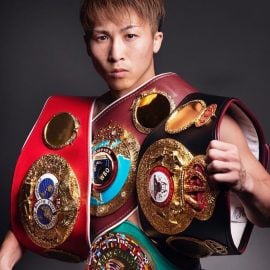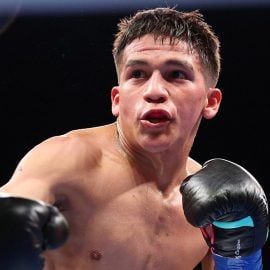Overtrained Berto teams with Conte to overcome Zaveck, anemia

Andre Berto couldn’t figure out why he was so tired before, during and after his WBC welterweight title defense against Victor Ortiz in April. A 27-year-old fighter known to some as “The Beast,” Berto said that he didn’t have any energy and felt “old” going in.
Despite giving all that he could muster during a brawl that featured two knockdowns apiece by each fighter, Berto suffered his first loss in 28 bouts by unanimous decision to Ortiz.
“I take nothing away from Victor Ortiz, he came to fight. But I couldn’t lift my arms, couldn’t move my legs and my body wasn’t there. Every time I tried to throw a combination, my body was just so exhausted,” said Berto, who was briefly hospitalized with dehydration afterward.
“Sometimes in the fight, the only thing that I could do was fall back to the ropes. I had trained hard, just like I always do, but my stuff wasn’t right. Everything was just dead to me. I fought on pure heart that night, but deep inside, I knew that there was a problem.”
Berto has since discovered his “problem” after having teamed up with controversial BALCO founder Victor Conte, whom he credits for re-energizing his workouts. After examining Berto’s blood samples, Conte found that the fighter to be overtrained and severely anemic.
“Overtraining occurs in athletes who train beyond their body’s ability to recover. Boxers are known to train long and hard, but often times it’s without adequate rest and recovery,” said Conte, whose supplementation program replinishes nutrients such as Iron in Berto.
“We’ve been routinely monitoring him and his biochemical profile has definitely improved. He’s still training hard, but he’s also training smarter and better understands of the value of the recovery interval.”
Berto (27-1, 21 knockoutss) will be out for redemption when he meets IBF titleholder Jan Zaveck (31-1, 18 KOs) at Beau Rivage Resort & Casino, Biloxi, Miss., on Sept. 3.
“Being anemic, it was like going into a fight with less than a half of a gas tank in your car. It’s only been about four or five weeks, but I definitely feel better,” said Berto, who meets Zaveck four days before his 28th birthday.
“Victor sat down and explained to me what everything does for my body and made me understand that yes, I was training as hard as I trained and getting in shape to a point. But I was also pushing my body to a point where it was ridding itself of good nutrients, and zinc, and other things to the point where I didn’t have too much left.”
A Haitian-American from a family of martial artists and combat specialists, Berto’s approach to relentless training started with his father, Dieuseul Berto, a former mixed martial artist.
“My pops, my coaches, my trainers, we’ve prided ourselves on just working tremendously hard and on always working harder than the next guy. It was just, ‘Go to the gym all day, every day,” said Berto.
“My family was basically established in the martial arts and combat sports in Florida, and that’s basically what carried me through.”
Berto’s younger brother, Cleveland Berto, was a high school state wrestling champion, a national champion and graduated from San Franciso State, which he attended on a wrestling scholarship.
Older brother Edson Berto is a former mixed martial arts welterweight champion, and his younger sisters, Revelina and Rochelle Berto were national champions in grappling and judo.
“All of us trained obsessively hard and that was always beat into my head. That’s the way that I had always worked,” said Berto.
“It was just the raw passion and the genetics and the ambition that I’ve always had just to constantly work hard. So I was like, ‘If it’s not broke, don’t fix it.'”
But the hard work ended up costing Berto, who was basically breaking and tearing his body down and working against himself.
“Some of these old school type training regimens actually decrease performance,” said Conte. “Overtraining can also suppress an athlete’s immune system. There are fighters who have overtrained until they’ve made themselves sick before a fight.”
But over the past two years, Berto said that he began to notice that his recovery rate had begun to drop off.
“My body was a little more sore and I would have more injuries and I found myself being more fatigued more often than normal, even though I continued to work as hard as I always had worked,” said Berto.
“If I didn’t feel like going to the gym that day because my body was tired and exhausted, I just made it happen. I didn’t believe in rest days and didn’t understand how important that is to your body. I think that in this last fight, it finally caught up to me, and I definitely paid for it.”
Berto was dropped in the first round and scored a knockdown of his own in the second. The fighters traded knockdowns in the sixth, Ortiz falling first, and then Berto.
After that, a sluggish Berto lacked energy throughout much of the remainder of fight
“I tried to rehydrate, but I had nothing left in my body,” said Berto. “I just didn’t feel right physically after the fight.”
At the hospital, Berto was diagnosed with dehydration.
“They couldn’t even draw blood because my blood had gotten so thick from being dehydraied,” said Berto. “They said that I didn’t even have enough potassium in my body and that they couldn’t understand how I made it through the fight. I finally just reached out to find out what the problem was.”
Berto sought out Conte, having gotten wind of his success with WBO and WBC bantamweight titleholder Nonito Donaire.
“After checking my blood levels, one of the first things that Victor said was, ‘You’re a tremendous athlete and you’re truly gifted to get where you’re at, but do you find yourself fatigued from time to time?’ ” said Berto. “I said, ‘Yeah, I do.’ Then he said, ‘Well, it’s really simple to see.’ He said, ‘You’re terribly anemic.'”
Conte determined that Berto’s iron storage “was very low.”
“Not having enough hemoglobin in the blood can reduce oxygen uptake and delivery, which results in fatigue and a lack of endurance. So in the past, Andre’s oxygen carrying capacity was compromised. As a result, I don’t believe we saw him bring his ‘A’ game to his recent fight with Victor Ortiz,” said Conte.
“We’ve been routinely monitoring him and his biochemical profile has definitely improved. He’s still training hard, but he’s also training smarter and better understands of the value of the recovery interval.”
Berto agrees.
“I’m used to working hard without taking any days off. Now, we’re working hard, but we’re also taking a lot of rest days all the way off, which is really something new to me. I’m drinking these protein shakes, and every time I exhaust my body, we’re putting nutrients back in,” said Berto.
“Normally at around this time of the camp, you feel drained, but I still feel really good. I feel like my body has what it needs. I wish that I had been doing this a long time ago.”
And just maybe, for Berto, The Beast” has finally returned.
Lem Satterfield can be reached at [email protected]















